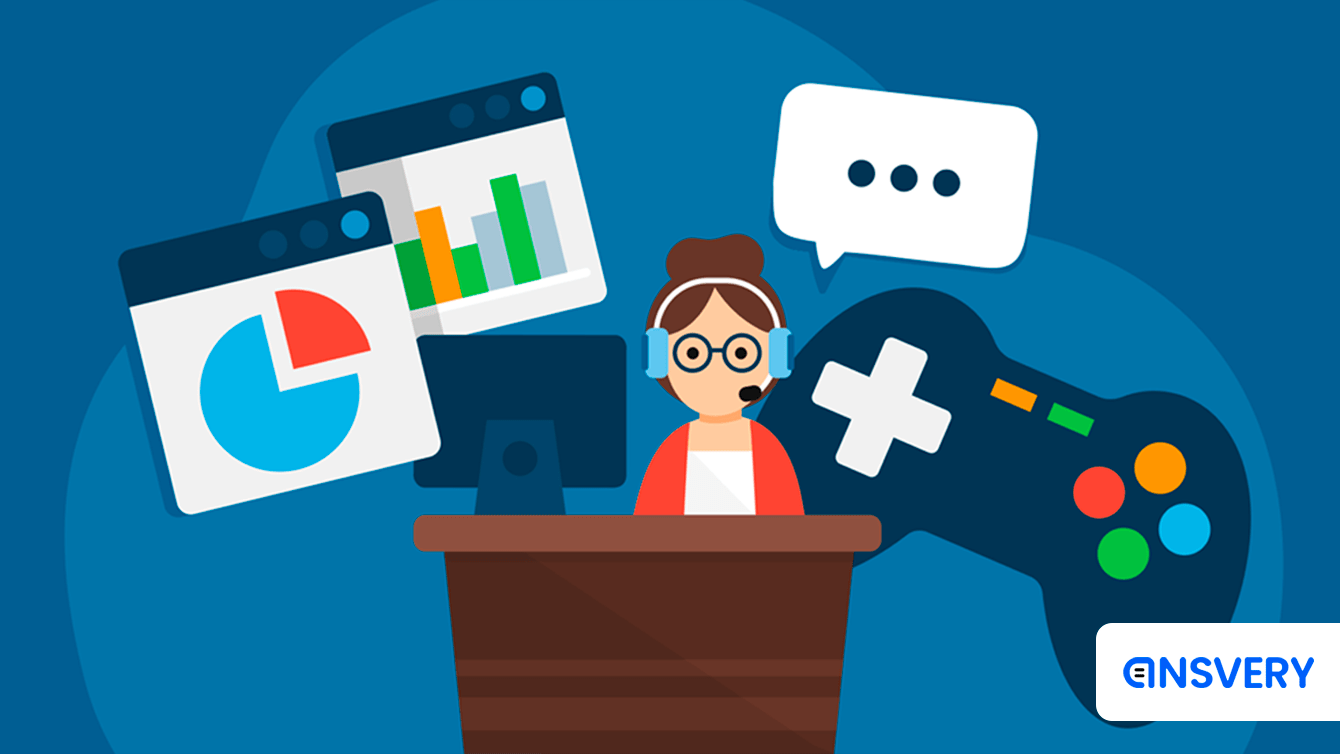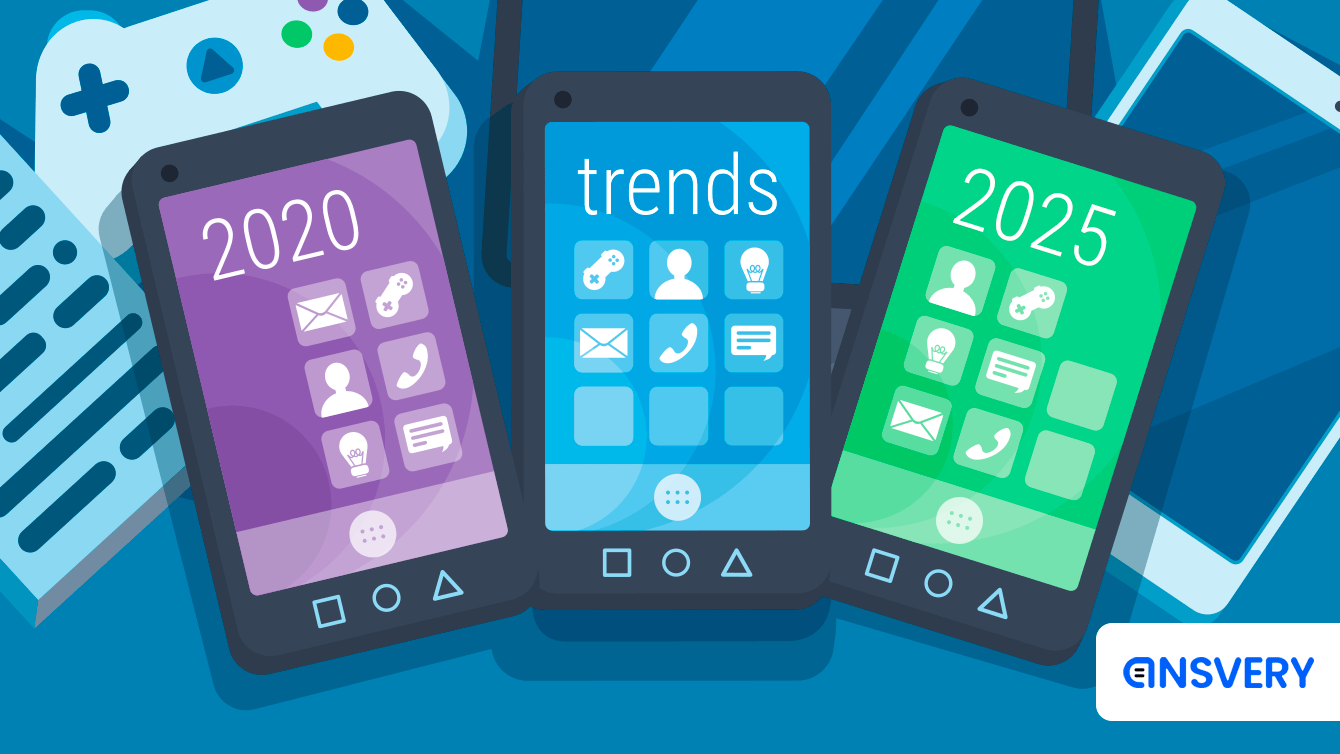Why Support Is Important. Pros & Cons of Different Integration Options
Here is the first article of the ”Support of mobile projects in details” series – a collaboration project of two experts of the market: Ansvery and international mobile game developer and publisher Azur Games. This series will be dedicated to the most important aspects of support, from interacting with your target audience and influencing the user experience to using support as an instrument for collecting data about bugs and other issues.
The author of the articles is Ekaterina Rogacheva, the head of community and support at Azur Games. Ansvery is happy to support the partners providing them with expert comments and a place to publish this important series.
Azur Game's portfolio boasts 35+ free-to-play games in various settings that have won over a sizable loyal audience, with DAU topping 6,000,000 users. Azur’s leading app, Stackball, has been among the top hyper-casual games for over three months. Azur Games doesn’t just develop its own games – it also has successful partnerships with studios, providing a full suite of publishing services for hyper-casual and mid-core games.
Ansvery is a professional team that provides outsourcing services for user support, building the support system from scratch.
When you should first consider support
You should start considering support on the stage of initial development: decide on the amount of time and resources you’re willing to spend on integrating support into your project and on its further maintenance. It’s a common mistake to think about support right before the release, not having enough time to prepare. It ends up with either implementing the simplest form of support, which is usually not the best option, or even releasing the game without any support at all. It’s important that at the release stage you already have a contact option along with at least 1 qualified employee responsible for interaction with players and collecting feedback.
Anna Bashkirova, product owner of the outsourced customer support Ansvery, adds that developers who are still in the process of creating a game should consider situations the user could potentially encounter and how these instances will be resolved, paying particular attention to the technical side of things. For example, let’s say you run into this problem: the player doesn’t get a chest they’ve paid real money for. In order to give the player their purchase, the agent asks the user to reveal the contents of the chest, and it’s all because the ability to view the contents of these kinds of purchases was never implemented during development. Needless to say, it isn’t possible to envision every potential complication, but if you don’t think about the various ways the user experience could develop, a situation that is critical to a user could end up being unresolvable.Which benefits a quality technical support provides to the developer
When you give the player an opportunity to contact you, you get an additional resource of information about problems and bugs. This is especially important during the few days after the initial launch or after releasing updates. When your first users start exploring the game, they are very likely to have questions, suggestions, problems, and they will definitely need your help. At this stage the project is yet to have any stable metrics which you could rely on, hence it’s so important to collect feedback from all available resources. Often serious technical issues, not found during QA testing, are discovered through the players’ feedback.
Usually, while playing your game, a lot of players come up with ideas and suggestions which you can use in the future. In Azur Games we are sure that there are no inviolable rules of mobile game design and that the only guiding line for the accuracy of our decisions is the expectations of our target audience, which is why user feedback is so necessary.
The especially important part is that the player who had good experience with technical support becomes more loyal to the project. Loyal players give the game good store ratings more often and are more likely to make in-game purchases in the future.
-
Timely information about bugs and issues, both technical and design
-
Useful user feedback: ideas and suggestions, constructive criticism
-
Loyalty of the users
Circumstances of not having technical support
For the user who has encountered an issue or unclear aspect of the game the opportunity to contact the developer is crucial. What will happen if you don’t provide them with such an opportunity? Well, the player will either just leave the game or find another way to share his problem. They are likely to write a bad review in the store or leave an angry comment on social networks. We’ll get more into the details of the risks of not having technical support in the next articles of the cycle.
Integrating technical support into your project
“Support doesn’t exist as an independent unit whose objective is to stem the tide. It’s one of the tools developers have to make the game better via user feedback and communication in order to increase retention and purchasing readiness”, says Anna Bashkirova. As part of the UX, support can be viewed based on a number of factors – but we’ll discuss this in a separate article. Right now let’s focus on issues such as the availability and integration of support.
Now let’s talk about the different ways of support integration and highlight their pros and cons from both the developer’s and the player’s perspectives.
Email address in the game settings or player’s profile
Perhaps, the most simple and quick way to implement the opportunity to contact you into your game. However, you should understand that this option is not perfect: you’re not allowing your users to contact you directly from the game. In order to create a request, they will need to leave the app, open their email and send their letter from there. As a result, the process will take quite some time. If an engaged player aims at sharing their ideas and suggestions with you then it probably won’t affect their enthusiasm. But if they have faced a problem then such a long process of creating a request may vex them even more, which in its turn will make your further communication more difficult.
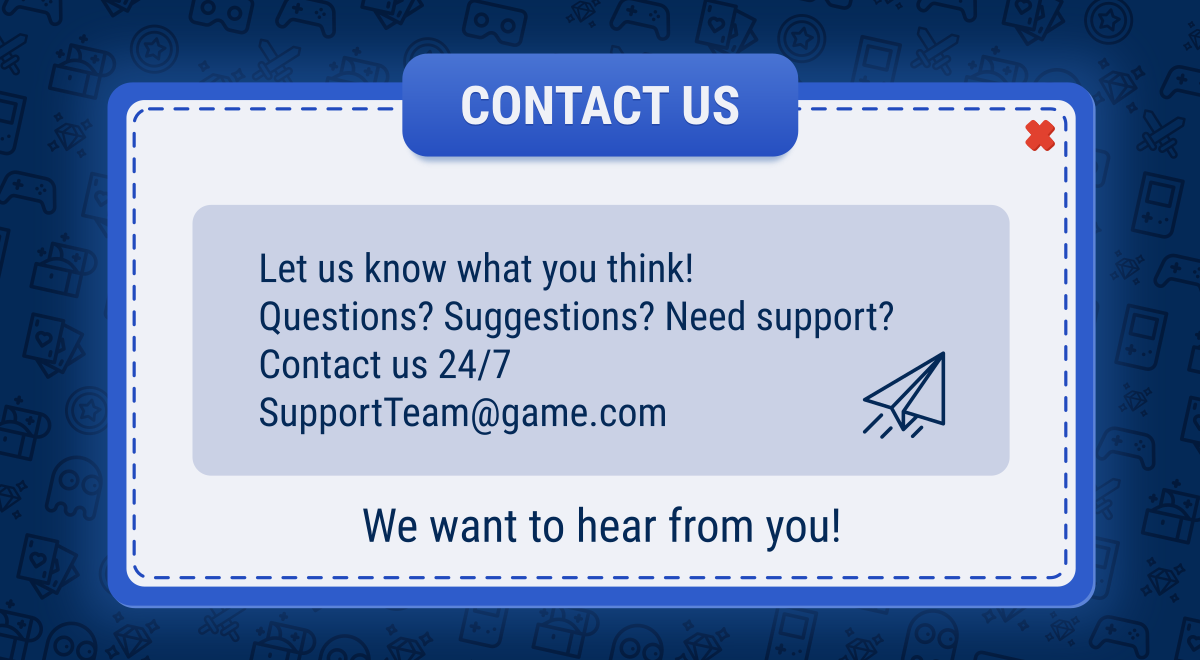
For developers: the easiest realization
For players: need to leave the app, long process of creating a request
From the player's comfort perspective this is the worst option, however, such an easy realization can make it attractive for a lot of developers. This option may suit indie developers and the projects that don’t have a big audience yet. In case you get a big quantity of requests, the need to filter and sort them will take quite a lot of time and effort, which will affect the speed of your replies and won’t allow you to prioritize the requests, so the best decision for you would be to choose another option.
Feedback form
From the developer’s side this option is more complex to implement, however, it significantly simplifies the process of creating the initial request for the user. A simple feedback form includes a message field and a field for the user's email. You can elaborate the form according to your needs: add “choose category” and tags for a more convenient request handling. However, in the end, your users will still need to leave the game’s client in order to reach your response. Which is, obviously, not good.
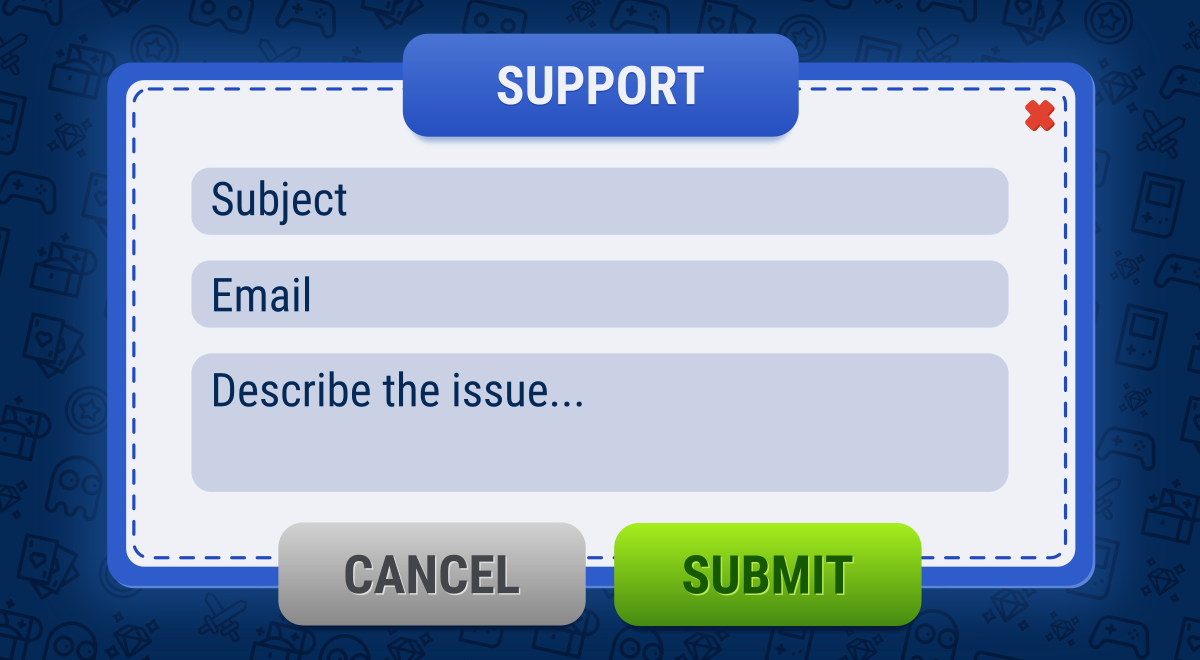
For developers: convenient request handling, more complex realization.
For players: easy process of creating an initial request, need to leave the app to get a response.
This option is relatively convenient for the user and may suit the projects with less requests as well as the projects with more requests. The advantage of the form is that it can always be elaborated according to the request volume. For example, if you have a big request flow, implementing request categories and tags will simplify the sorting process and allow you to divide the request by their priority.
In-game support chat
The most convenient option for the user to contact you, because all the support is carried within the game. The chat is the hardest feature to realize from all of the options. You can either develop it yourself or make it easier and use the pre-made tools provided by such services as Zendesk or Helpshift. Keep in mind that with chats users usually expect quick responses, which means you will need more employees to handle the support. However, there is a way to lower the request volume, letting the user to solve their issues without asking for a specialist’s help – I will talk more about it in the next articles.
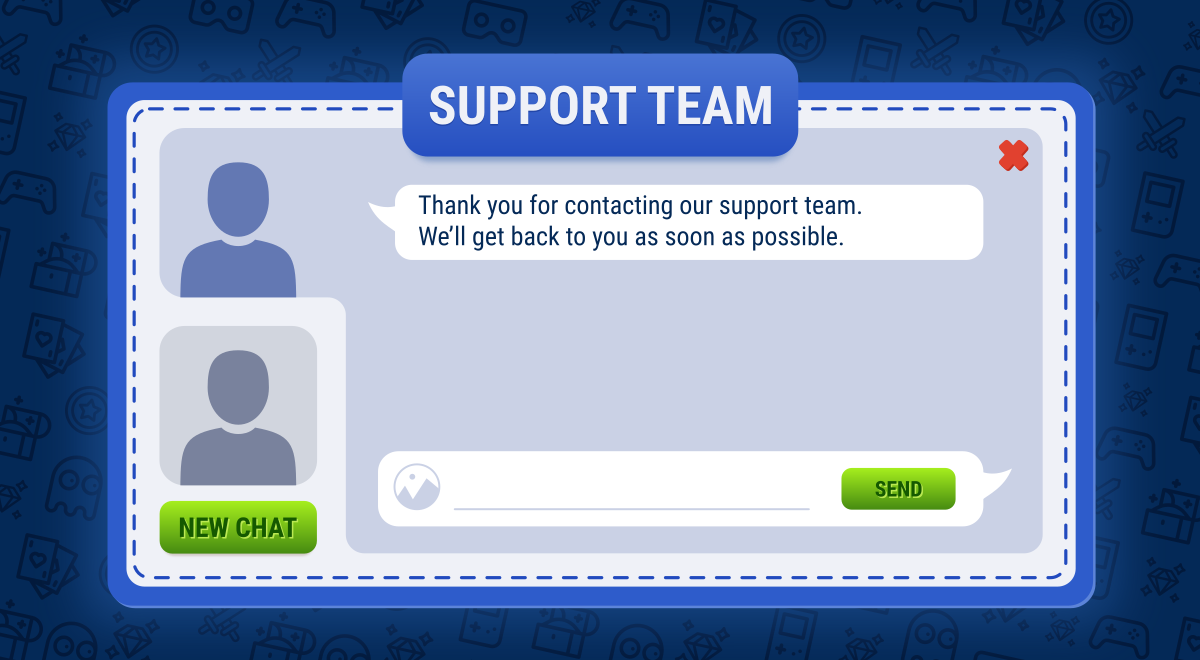
For developers: complex realization, you’ll need more employees to provide quality support
For players: technical support is fully within the game
From the player’s perspective this is the best option, however, due to its complex realization and the need to use more resources for support handling, it’s unlikely to suit smaller projects.
So, we’ve talked about the benefits that you can acquire by providing your users with quality support. We’ve also looked into 3 basic options of integrating support into your app. Despite the fact that some options are more convenient for the user than the others, it’s important to understand that the satisfaction of the user mostly depends on the speed and the quality of your answer. We’ll get more into it in the next articles of the cycle.

